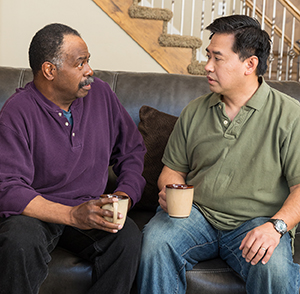When someone you love has dementia, it’s normal to want to do as much as you can to help. But you can’t take good care of someone else if you don’t take care of yourself, too. So be sure to take breaks when you need them. It’s not selfish. It’s essential. Get out to see friends. Eat a healthy diet. Remember to visit your own health care provider for regular checkups. Most of all, accept that you can’t do everything yourself.
Make time for you
It’s vital for you to spend time outside your role as caregiver. It may not feel right at first. But even simple things can ease stress and keep you refreshed. Try the following:
-
Go to a movie or concert.
-
Go to the gym.
-
Have a meal with friends.
-
Take a walk.
-
Read a book or write in a journal.
-
Pursue a hobby.
Talk to others
Talking to others is often a big stress reliever. Sometimes you just need a friend or family member to listen. At other times, you may want to talk to a professional you trust. This could be a counselor, social worker, clergy member, or therapist. Another good option is joining a local support group for caregivers. Joining a support group can help you feel that you aren’t alone. It’s also reassuring to share thoughts and ideas with others who are going through the same things as you.
Get temporary help
Finding time away isn’t always easy. But you do have options for respite care (temporary help). Draw on support from family and friends. And accept help when it’s offered. People who care about you and your loved one really do want to help. Try these tips:
-
Ask a friend to spend the evening with your loved one.
-
Hire a home health care worker for regular breaks.
-
Check with your neighborhood community center. They may be able to guide you to adult day programs.
-
Have family or friends help by shopping or bringing over a meal once a week.
-
Contact local support agencies or a social worker for respite care recommendations.
Accept your emotions
The stress of caregiving can seem overwhelming at times. You may feel frustrated, sad, or resentful. This isn’t a sign you’re doing something wrong. It’s completely normal. So accept these emotions as they come. However, if you find yourself feeling hopeless, tired, sad, or guilty most of the time, talk to your health care provider. These feelings may be signs of depression, which can and should be treated.
Know when to make a change
The time may come when you can no longer care for your loved one safely. It may be that they require more supervision. Or you may find it too hard to cope with the daily stresses of caregiving. No matter the reason, it’s OK to make a change. It doesn’t mean you’ve failed. Changing the situation may be best for everyone. You’ll still be able to spend plenty of quality time with your loved one.
Featured in


